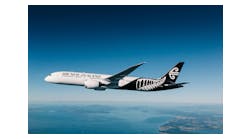Dec. 13--The nation's airlines have been tacking on fees for several years in an effort to reach profitability. And they finally have.
Most of the fees, for such things as checking luggage and making reservation changes that weren't charged in the past, haven't been well-received by passengers -- but they've paid them.
And while the airlines are making money now, the fees haven't stopped. But some of the newer fees are actually being liked by travelers.
One of the first of the new fees gives passengers extra legroom, as the airlines have found extra space for a limited number of seats by reconfiguring some of the rows. And for a round-trip fee of $100 or so, you've got more legroom. We've tried it and are happy with it, particularly on long overseas travel.
And there are other new fees -- optional like the rest -- that promise more of the good life, as the Associated Press reports. These include early boarding and access to the airlines' private clubs.
And even more options are becoming available, the AP reports. Some airlines are now renting Apple iPads preloaded with movies, selling hot first-class meals in coach, and letting passengers pay to have an empty seat next to them.
The airlines are adept at dreaming up new creature comforts -- again for a fee -- notes airline consultant John Thomas in the AP article. What they reportedly intend to do in the future is use the massive amount of personal data they have collected on each passenger to enhance the individual's travel experience. So you might get a bevy of offers that's tailored to you personally.
The reason for these new fees, which so far most passengers feel are positive, is that while fees bring in some $15 billion a year, revenue from the older charges -- for baggage and reservation changes -- is tapering off. For the first quarter of this year, fees fell by 7 percent compared to a year ago.
Technological advances are one reason that airlines can sell these add-on services directly to passengers. Carriers sell them directly to passengers at booking, in follow-up e-mails as trips approach, at check-in lines and on mobile phones just prior to boarding. Delta, it's reported, recently gave its flight attendants wireless devices, allowing them to sell passengers last-second upgrades to seats with more legroom.
The airlines have found that fees are the best way to raise revenue since it's clear that when passengers have a choice between airlines, they will go with lowest basic fare. And when airlines try to raise fares, there's resistance from passengers.
Most fares today don't cover the airlines' costs. The AP notes, for example, that while the average domestic roundtrip base fare has climbed 3 percent over the past 10 years, to $362, when adjusted for inflation, the price of jet fuel has nearly tripled.
Airline fees began with added baggage charges in 2008 when oil prices spiked. Now airlines are casting fees as "trip enhancements" -- something positive to make the trip more enjoyable, rather than negative.
Tuk tuks go solar
If you've been to Southeast Asia, particularly to China, Thailand or Vietnam, you know what a tuk tuk is.
But for the uninitiated, they are relatively small auto rickshaws that can more quickly transport passengers through downtowns in cities that are overcome with traffic -- passenger cars, taxis, delivery trucks and buses, which can barely move through the congestion there.
The tuk tuks, which can carry two or three people plus a driver, now are making an appearance in other countries, like in Europe, the U.S. and Australia, for tourism purposes.
But there's a problem: Many tuk tuks are powered by gasoline engines and add greatly to air pollution in otherwise heavily-polluted cities like Beijing, Bangkok and Hanoi.
Now, many cities -- and Beijing is one of them -- have taken steps to ban or restrict their use due to their emissions. As a result, according to Global Travel Industry News, tuk tuks may become solar powered.
An Australian solar producer has developed a new tuk tuk which runs on solar power from its rooftop. The producer of the Solar Tuk, Star 8, says it has attracted significant interest from countries such as China, India, Vietnam, the Philippines, Bangladesh, South Africa and Nigeria, as well as many interested parties from the Australian tourism industry.
The creator of the product, Jacob Maimom, came up with the concept on a trip to Vietnam, where drivers only put small amounts of gasoline in their tanks at a time, he told the publication. The reason, he was told, was that the cost of fuel there was so high that drivers could barely cover expenses.
"It was then that I envisioned a solar-driven tuk tuk with an electric engine (as a back-up), which costs next to nothing to run," he said.
Copyright 2013 - Post-Bulletin, Rochester, Minn.




